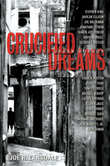Crucified Dreams: Tales of Urban Horror
Joe R. Lansdale, editor
Tachyon Publications
Trade Paper, 384 pages, $15.95
Review by Sheila M. Merritt
Cities can be terrifying: There’s crime, corruption, and a sense of frightening faceless anonymity. In Crucified Dreams: Tales of Urban Horror, editor Joe R. Lansdale compiles tales that manifest metropolitan malevolence and menace. A variety of locations is covered, and the diverse works are not confined to the horror genre. The narratives can best be categorized as speculative fiction. As with many themed anthologies, not all the tales tightly adhere to the concept; the city may be merely an incidental element, not the focus. The stories do, however, reflect the individuality of the stellar assembly of authors, who include: Stephen King, Harlan Ellison, Joe Haldeman, and David Morrell.
Morrell takes the reader inside the superficiality of Los Angeles’ movie industry in “Front Man.” A talented and reliable writer finds he’s lost his cachet in the business. A victim of ageism, past accolades and awards work against him; they are considered relics of yesteryears. He is a legend longing for employment; a man more of substance than style. In a brilliant scene, the veteran appraises a shallow studio executive: “He wore an Armani suit, fashionably wrinkled. No tie. Gucci loafers. No socks. His skin was the color of bronze. His thick, curly, black hair had a calculated, wind-blown look.” Observing such debonair depthlessness leads the protagonist to acknowledge the flimsy flash of the film world.
When he sees an opportunity to salvage art through artificiality, he seizes it. A good looking but untalented writer crosses his path, and they become a team: The handsome charmer schmoozes with the movers and shakers, while the adept expert knocks out the screenplays. They sham and scam. This symbolic and symbiotic relationship ends badly, and with ample irony in Morrell’s very capable hands.
Still on the West Coast, Michael Shea’s “Copping Squid,” gives San Francisco a taste of Cthulhu culture. Shea does a fine job conveying the magical undercurrent of the city by the bay: “When he was a kid, he’d always felt sorcery in the midnight streets, in the mosaic of their lights, and he’d never lost the sense of unearthly shapes stirring beneath their web, stirring till they almost cohered, as the stars did for the ancients into constellations.”
Going inland, Lewis Shiner writes of Texan sexual hankerings and hanky panky in “Love in Vain.” A pervasive, indeed perverted, macho mentality is well summed up with this passage: “Driving in Dallas is a matter of manly pride: if somebody manages to pull in front of you he’s clearly got a bigger dick than you do. Rather than let this happen, it’s better that one of you die.”
A more romantic, but equally delusional, look at love is depicted in “Loss” by Tom Piccirilli. Set in New York City, this tale of a scribe who laments his career and personal life is funny and full of fantasy. Fiercely jealous of his former best friend, a hugely successful author, the first person narrator is besotted with the wife of his bete noire. Dwelling on the situation, the main character envisions the rapture of which he is deprived: “I thought of them entwined after having just made love, now feeding each other wine and caviar. I hated caviar the one time I tried it, but when I thought of romance that’s what came to mind. The window open and a cold breeze pressing back the curtains. Moonlight casting silver across the dark. The sheets clean but rumpled.” Living in the wonderfully named Stark House contributes to the reveries; the building’s other tenants include his object of desire and her husband. The abode has a history, of course, of odd occurrences. And most of the people who live there are eccentric, to say the least. Piccirilli enjoys playing up the quirks and brandishing the bizarre. Delightfully demented, “Loss” is a winner.
The nineteen stories that comprise Crucified Dreams: Tales of Urban Horror are reprints. They are prime pieces by respected genre writers. Readers of science fiction, fantasy, and horror will find something within their respective (or overlapping) tastes to enjoy in the collection.









